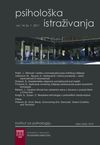Expectancy as a Mediator of the Relation between Learning Strategies and Academic Achievement among University Students
Expectancy as a Mediator of the Relation between Learning Strategies and Academic Achievement among University Students
Author(s): Orhideja Shurbanovska, Biljana Blazhevska-StoilkovskaSubject(s): Education, Psychology, Higher Education
Published by: Филозофски факултет, Универзитет у Београду
Keywords: learning strategies; expectancy component of motivation; academic achievement; mediation analysis;
Summary/Abstract: The aim of this study was to explore the mediation role of the expectancy component of motivation (self-efficacy and control beliefs for learning) in the relationship between learning strategies (cognitive, meta-cognitive, resource management strategies) and academic achievement. The sample consisted of 155 university students (85 psychology students and 70 architecture students). Learning strategies section from the MSLQ (Motivated Strategies for Learning Questionnaire) was taken to assess the extent of learning strategies usage during exam preparation. Motivation for learning was measured by the Expectancy scale as a part of the Motivation section of the MSLQ. Mediation analysis was used for data processing. Following the proposed steps for mediation effect testing, a series of regression analyses was conducted: first, the expectancy component of motivation was regressed on learning strategies; second, academic achievement was regressed on learning strategies; and third, academic achievement was regressed on the expectancy component of motivation. It was found that learning strategies influence academic achievement indirectly through the expectancy component of motivation (Sobel test=2.18; p=.029). It is emphasized that students should be encouraged to use learning strategies in knowledge acquisition.
Journal: Psihološka istraživanja
- Issue Year: 16/2013
- Issue No: 1
- Page Range: 17-27
- Page Count: 11
- Language: English

